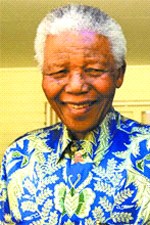'He is a giant among men. He has inspired millions of people on the continent and around the world.' These were the words of Jesse Jackson in commemoration of Nelson Mandela's 95th birthday at the United Nations.
But why is Mandela so revered across the world? What makes him so influential? Well, the answer lies in the 'Madiba Magic' - an expertly crafted personal branding that holds invaluable lessons to brand success.
Nelson Mandela's iconic status is anchored on three key building blocks that characterise strong brands: meaning, difference and salience.
A research which links neuroscience and survey data to consumer shopper behaviour, conducted by Millward Brown, revealed that, '...brands that score highly on meaning, difference and salience capture five times more volume, command a 14% price premium and are four times more likely to grow value share during the next 12 months.'
Mandela stands for justice and peace: A distinctive meaning is a requisite to brand success
Remember that a brand is not found in the shop floor. Neither is it made in a factory. A brand exists only in consumer memory, as an associative network of images, sounds, smells and experiences.
It is through the link to this network that a brand name finds its meaning. Brand meanings are key criteria in the interpretation and evaluation of products by consumers. This is why brands with clear meanings, which resonate with consumers, are a leg up to achieving success.
A number of the world biggest brands are legendary because consumers know exactly what they stand for. Consumers for instance know that 'Coke brings joy.' Having a 'clear brand meaning' in part explains Mandela's phenomenal achievements.
Brand stories must be backed by action: Mandela's career path defined his dream
Brands mostly communicate their meanings through advertising stories. However, giving the brand story alone is not the full answer. The stories should be backed by a well orchestrated accumulation of activities that reinforce the brand meaning throughout the brand lifecycle.
Consumers want to see the brand playing a role in their lives. For instance Coca-Cola's sponsorship of sports, like the Olympics and junior school football is not incidental. It is one engaging way of associating the brand with its ideals of fun and happiness.
Mandela used names, flags and concepts to convey his values: A signage system can be used to manifests brand meanings
Over the years most of Coca-Cola's communications have depicted the red colour and now the brand owns the colour as it were. The Coca-Cola red and other brand signs like the shape of the Coca-Cola bottle and fizziness are employed to convey what Coke stands for: fun and happiness.
Similarly, Mandela ingenuously used his clan name, the South African flag and other concepts to connect with people and to drive unity messages home while building the post-apartheid South Africa nation.
Mandela is also called by his clan name: 'Madiba.' The name has also caught on beyond the borders of South Africa, with people like President Obama of the United States using the name to address Mandela.
Brand meanings must be jealously safeguarded: Madiba had to make tough decisions in order to uphold his ideals
Once brand meanings have been defined and established, they have to be jealously safeguarded and this can sometimes call for tough choices.
In 1985, Coca-Cola invested millions of dollars in the development of the 'New Coke' but it had to dump the new formula after research revealed that the formula did not support the essence of the brand.
Saliency is pivotal to brand success: It's the magic behind Madiba's numerous awards
Saliency is another quality a brand needs to make it on the marketplace. Brand saliency should not be confused with brand awareness. Saliency is much more than awareness. It is the extent to which a brand is perceived when the consumer is faced with a buying situation - 'the Moment of Truth.'
In low involvement purchases - especially for FMCGs, saliency is a big factor behind brand performance. It largely defines whether the brand will be leader or an underdog within its category. High saliency is partly behind Coca-Cola's dominant position in the beverages category.
Madiba had unique approach to politics: Distinguishing associations play a critical role in brand choice decisions
There are two broad bases on which brand differentiating associations are built. They can be derived from the unique attributes possessed by a brand or created through advertising, where symbolic meanings that were not originally connected to the product have been constantly linked to the brand, with the brand ultimately owning these meanings.
Symbolic meanings should represent values that are important to the consumer. A well differentiated brand can become the only acceptable product within its category to a given set of consumers, giving the brand owner significant pricing leverage.
Madiba's cult status, worldwide suggests that he is the prototypical leader Africa and the indeed the world would want to have. His life and career offers a prime example of how a brand can endear itself to consumers through differentiation.
Consumers respect brands that live their narrative and despise the ones that do not.
Packaging is a valid basis for differentiation: Madiba's trademark Batik shirt conveys his humility and simplicity
As the technological space for innovation in the saturated smart phone market wanes, colour and style of the casing has become the new battleground for differentiation.
On its recently launched Moto X phone, Google is offering customers an opportunity to specify the look of the phone. Meanwhile, Apple announced the launch of its two sets of phones, the 5s and 5c. The phones will come in a myriad of colours, breaking from Apple's tradition of offering its models only in black and white.
The current war among smartphone brands confirms the differentiating opportunities offered by packaging. In equal measure, politicians are known to use trademark dress codes to portray a distinct personality.
In her article called 'The Politics of Dressing' Evelyn Matsamura Kiapi describes how Mandela popularised the Batik shirt, now dubbed the 'Madiba shirt' in South Africa. The shirt not only identifies Mandela as a hero but also symbolises his humility, simplicity and moral leadership qualities.
As Madiba reaches what he has called 'the evening time' of his life, a case study of his extraordinary life story has inspired humanity in many spheres, including the nurturing of brands.
The man, who the Time Magazine places among the 100 most influential people in the world has been often quoted as saying "If you talk to a man in a language he understands, that goes to his head. If you talk to him in his language, that goes to his heart." Now here is a challenge: Is your brand talking to your consumer's heart?


















































